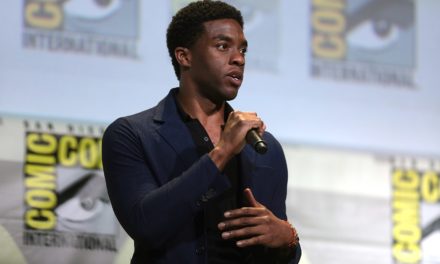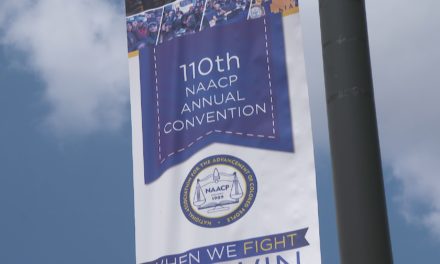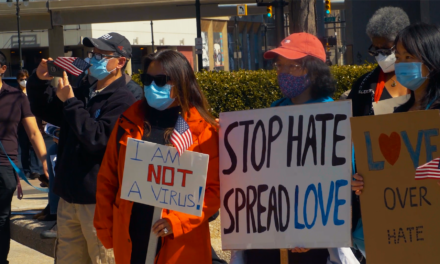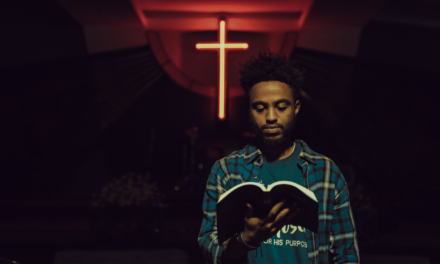In the wake of the recent mass shootings across the country, American Black Journal continues its “The Black Church in Detroit” series with a look at the Black church’s role in reducing gun violence in the community. We start with a look at how pastors, like Rev. Cindy Rudolph at Oak Grove AME Church, are talking to their congregations about the violence.
RELATED: Reducing Gun Violence and Crime in Communities of Color
RELATED: 15th Annual Silence the Violence March Rallies to Stop Gun Violence in Detroit
RELATED: Racially Motivated Buffalo Grocery Store Shooting Kills 10, Injures Three
Then, Host Stephen Henderson sits down with Pastor Barry Randolph of Church of the Messiah Detroit and Rev. QuanTez Pressley, lead pastor at Third New Hope Baptist Church and a member of the Detroit Board of Police Commissioners, for a frank conversation about the root causes of the mass shootings, the church’s role and resources in disrupting the violence, and the candid concerns of young people in their congregations.
Full Transcript:
Rev. Cindy Rudolph, Pastor, Oak Grove AME Church: Here we are. Dressed in our orange. Remembering those who have died senselessly to gun violence. And instead of coming together to combat this culture of senseless bloodshed, we are more divided than we ever were. Because there are those who could, in fact, make a change and make a difference. But instead, they allow laws to remain in place that protects gun manufacturers from being sued and refuse to pass laws to protect our children from being shot in school.
This is not who God created us to be. This is who we are not. All week long, some of us saw on television family members and survivors and even frontline workers who have testified before Congress about just how horrific it was when those babies and those teachers and defenseless victims were slaughtered in cold blood. And yet there are those who insist that their right to own a military-style assault rifle is more important than the right for innocent victims not to be murdered in cold blood. This is not who God created us to be. This is what we are not.
Stephen Henderson, Host, American Black Journal: Now some churches, like Detroit’s Church of the Messiah on the East Side are taking their efforts to the streets. That church recently held its annual Silence the Violence march and rally. And later this month, it’ll kick off a series of summits called State of the Hood.
Stephen Henderson: First meeting will focus on the church’s role in stopping gun violence. I sat down with Church of the Messiah’s Pastor Barry Randolph and Reverend QuanTez Pressley, who is the lead pastor at Third New Hope Baptist Church and a member of the Detroit Board of Police Commissioners. Pastor Barry, I’m going to start with you. The march that you have each year to highlight violence, to highlight the opportunity, I think, to intervene in the cycle of violence. Tell us about that. Tell us why you do it and what it means in the community where your church is located.
Barry Randolph, Pastor Church of the Messiah Detroit: Thank you so much, Stephen, for the question. June the 4th, we had our 15th annual Silence the Violence march and rally. The march actually honors the innocent victims of gun violence. That’s the reason why we do that. The rally gathers the community groups together that work on violence interruption.
So the groups come out. They give people an opportunity to be able to join them, find out what’s going on in the community. And it gathers everybody from not just Island View, but we have people from all over the state come. And there were well over a thousand people who showed up which just kind of let me know everybody is sick and tired and they want to work together. So this is all about people from Detroit and across the state coming together to eradicate gun violence.
Stephen Henderson: Reverend Pressley, talk about the church and again, its opportunity to interrupt this cycle of violence. We live in a city where there has been too much violence for years and years. And, of course, the last few years, I think, have gotten much more intense in terms of the number of incidents, the kinds of incidents that we’re seeing.
Stephen Henderson: The church plays such an important role in people’s lives in Detroit. Where does it fit in this particular issue? And where is that chance to interrupt it?
Rev. QuanTez Pressley, Pastor, Third New Hope Baptist Church: Yeah, great question. I think that first and foremost, Chief White at the funeral services for a fallen officer, Lauren Quart, mentioned that he needs everybody to do their part, that everyone in the community has a part to play. And I believe that the church has an essential part in that fight in combating against the bias that we see in our communities.
And I think first starts with the moral message that God stands on the side of life. All that we know about the Scriptures is an affirmation of life. And so we as the church should do everything that we can to secure and to protect a full and flourishing life. But I think there’s two areas in which we can have more specific input. We know that a lot of violent crimes occur as a result of poverty. And so a number of our programs are aimed at helping people to alleviate the poverty that they experience so that they don’t have to engage in crimes that often leads to violence.
And then we also have been hearing the conversation about how important mental health is. Again and being able to mitigate violent responses in our community. And likewise, I think the church can play a very important role. Here at Third New Hope, we have a season of Grace Ministry that provides mental health services to those who are in need. And so I think that if we address poverty and mental health, particularly from a spiritual and moral point of view, that we can begin to disrupt the kind of violence that we’re seeing in our community.
Stephen Henderson: Yeah. Pastor Barry, young people are such an important part of your church and your community down in Island View and you already do so many things to try to give them opportunities to make the right choices to build productive lives for themselves. Talk about in that work how violence comes up, the role it plays in these young people’s lives already. And again, what role do you see the church playing in trying to disrupt that?
Pastor Barry Randolph: The church does play a role in disrupting violence. And one of the ways that we do that is we do work on the issues of poverty and bringing people out of poverty, but also too, it’s about changing the mindset. Changing the mindset to let people know that greater as he does in you than he does in the world and being able to give you the resources to be able to do that. The church is the resource. So a lot of times in disadvantaged communities, there’s a lot of poverty because there’s not a lot of economic opportunity. There’s not a lot of educational opportunity. There’s not a lot of entrepreneurship opportunity.
The church fills in that gap by being able to become the hub through which you can get back in school, that you can go to college, that you can get a job, and where you can start a business, and at the same time you can actually work on your spirituality and your relationship with God. So the church kind of fills in the gaps knowing that there is an issue of violence in our community and neighborhood. And most young people, they don’t want to choose the violence. But it’s a thing of, there’s so few options in the community and neighborhoods, a lot of them feel like they have to take that choice.
Stephen Henderson: Reverend Pressley, I want to give both of you a chance to talk about the ways in which this particularly this recent increase in violence affects your church community. I think for all of us, on a certain level, this becomes very personal. This becomes about people we know. This becomes about people we care about. And I know that churches, of course, are not immune for that. So talk just a little bit about how this is affecting your congregation and your community right now.
Rev. QuanTez Pressley: Yeah. Thank you for the question. And again, I think that it’s very important to remember that often we talk about the preventative measures, but a place that the church plays a huge role is usually in the after effects. When families have become victims of violence, it is the church that steps in and provides comfort and support for these families. And so we see funeral services, particularly from my advantage point, with people who are younger than I am. It really does tug on my heart to recognize that there is some young person with great potential whose life was snuffed out from them, way before their time.
And so when you’re looking in the faces of grandmothers and mothers, sisters and brothers, and having to comfort them as a result of senseless violence, it really does begin to weigh heavily upon the faith community. And it is that weight that compels us to act because we cannot sit idly by and allow it to continue to perpetuate. But we must do our part to see what we can do to pause, if not completely eliminate the level of violence that we’re seeing in our community. Not only just gun violence, but violence in total.
Stephen Henderson: Yeah. Pastor Barry, what’s this look like in your church and in Island View?
Pastor Barry Randolph: Well, the conversation that I had with the young people a few weeks ago, we were talking about something seemed to have changed. There’s something that’s changed over this last year, the last couple of years. We know COVID has a lot to do with that, with isolation, things of that nature. But one of the things that I told them that 50-60 years ago this was not an issue. The way that it is now. And I explained to them how the church has always stood up during the time of everywhere from slavery, civil rights, Jim Crow, that the church has always been the voice of reason. It’s always been the place where you can come, where people got together and they stood up against immorality that was in our communities and neighborhoods.
And something’s changed because I told them when I grew up there was no such thing as a driveby. There was no such thing as a carjacking. And now this is becoming normal in the same way that system is put in place, we can change that system. Change the system during the civil rights movement. We can change the system now. We have to agree that we’re going to do this. Best place to do it is the church. We have a moral obligation and responsibility to do it, and ours come from the book.
Stephen Henderson: Reverend Pressley, as you pointed out, you’re closer in age to some of the people who, the young people who struggle with this issue than I am or Pastor Barry. This idea of it being different, this idea of this not being the way things used to be, I wonder what you make of why that’s true, whether that’s true in your experience and why.
Stephen Henderson: What has changed? What is either missing or present that makes the city feel so different? I think especially for young people, right? I think they feel like they live in a different place than I might have when I was growing up here in the ’70s and ’80s.
Rev. QuanTez Pressley: Yeah, it’s interesting that you would say that, because according to data, I sit on the Board of Police Commission and each week we receive the data from the city of Detroit. And violent crimes are actually down this year than it was in the year before. And so I don’t know whether it’s anecdotally that we’re feeling more violence. Maybe it’s a matter of social media being able to show these images over and over again that makes it seem more frequent than it might be. But I do think that one of the issues is that there’s a failure on all parts of institutions in the eyes of young people. Every institution that, let’s say in the ’60s and ’70s that would look to for some level of guidance, a standard bearing has all changed.
Whether that’s the criminal justice system, whether that’s churches, schools, even families, broken families, all of these institutions have crumbled before young people’s eyes. And I think that there is a lack of a sense of a real future. And when you don’t have a sense of a real future, you will really make some very risky decisions with your presence.
And I think that that’s the case with a lot of the young people. Not having real goals about seeing themselves as 40 or 50 years old. They make decisions that oftentimes end their lives before they have truly lived. And so one of the things that I always try to do is to encourage them to think beyond the present. I ask them questions like, what do you think your grandchildren will think about that? So multiple generations from where they are now, forcing them to have a more long-term view, which might mitigate some of the risk that they’re willing to take in the present.
Stephen Henderson: Yeah. And as you mentioned, you’re a police commissioner here in Detroit as well. And part of the system that tries to hold the police department accountable for the job it does and for its behavior. Talk about from that perspective, this violence that we’re dealing with and I guess what’s needed. Right. What are the levers we should be pulling in that arena that would have an effect on this?
Rev. QuanTez Pressley: Yeah. So violence has been with us always. I mean, I think the Bible, even as early as Genesis, we realized that human beings have this predilection toward violence. But I think guns have entered a new wrinkle because of how quick and how fatal it can be. And even as we’re seeing now, these mass shootings where numbers of people are losing their lives in one setting has really made it a challenge. And so, the thing that I’m struggling with is that there’s limitations to every institution. There’s limitations to what churches can do to eliminate violence. There are even limitations to what law enforcement can do to prevent it. Often they’re responding to incidences after they’ve already occurred, but there aren’t many resources or tools to prevent it.
And so, I kind of land on when are we going to have the conversation about the amount and the accessibility of guns in our community at large? Because if we can eliminate guns from the conversation, then it gives us a little bit more space to begin to talk about how we can eliminate violence in totality. But while we have guns in our community, where just on the whim an individual is… Let me mention this at a Board of Police Commissioners meeting, the numbers of gun incidences that we were hearing about were teenagers, and they were accidental gun shootings where a child would pick up a gun and either injure themselves or someone else.
These things can be prevented with the right level of education, but more importantly, with the lower access of guns in our community. I think that’s a conversation that most people don’t want to have, but I think it is crucial to really changing the nature and condition of gun violence in our community.
Stephen Henderson: I mean, that’s one thing that is absolutely different today than it was 40 or 50 years ago, is the number of guns that are available. I mean, there are more guns in America than there are Americans. That wasn’t true in the 1970s and ’80s. And there are no question that the access, the easy access to those is one of the drivers here.
Stephen Henderson: Pastor Barry, if you can talk just a little about what you hear from young people who are living through this time and have to manage, you know, the violence that does exist, have to kind of keep their focus on the future and opportunity, as Reverend Pressley was talking about. What do they say to you about all of this and what they want to see be different?
Pastor Barry Randolph: Well, I have to comment on something that Reverend Pressley had mentioned when he said that young people, they are losing hope in established institutions. And that is the part that is so true that they are losing hope. And they kind of feel like they can’t believe that adults can’t figure this out. They cannot believe that adults with common sense and cannot figure this out.
They cannot believe that whether it’s government officials, whatever leadership ability you’re in, they cannot believe that this cannot be figured out by adults and they believe that they’re going to have to do something about it. A lot of them are trying to figure out different ways of being able to build out community, neighborhood, have conversations among themselves and see what it is that they could possibly do.
They want a different future and they want people who are not, who have not sold their soul out to any type of entity to be able to stand up and stand up for them. We had a conversation where we were talking about there’s 400 million guns in this country and about 330 million people. And that just kind of blew their mind. And they just talked about how easy it is, it’s easier to get a gun than a driver’s license.
And they want to be able to change the system and they want to see it where it’s a lot harder. But they also want to be able to see opportunities. They know they got to work on issues of racism and not just gun violence. They have to work on gender equality. All these different things. They know that these are issues that’s got to take place. They’re just disappointed in adults when it comes down to it.
Stay Connected:
Subscribe to Detroit Public Television’s YouTube Channel & Don’t miss American Black Journal on Tuesday at 7:30 p.m and Sunday at 9:30 a.m. on Detroit Public TV, WTVS-Channel 56.
Catch the daily conversations on our website, Facebook, Twitter and Instagram @amblackjournal.
View Past Episodes >
Watch American Black Journal on Tuesday at 7:30 p.m. and Sunday at 9:30 a.m. on Detroit Public TV, WTVS-Channel 56.




